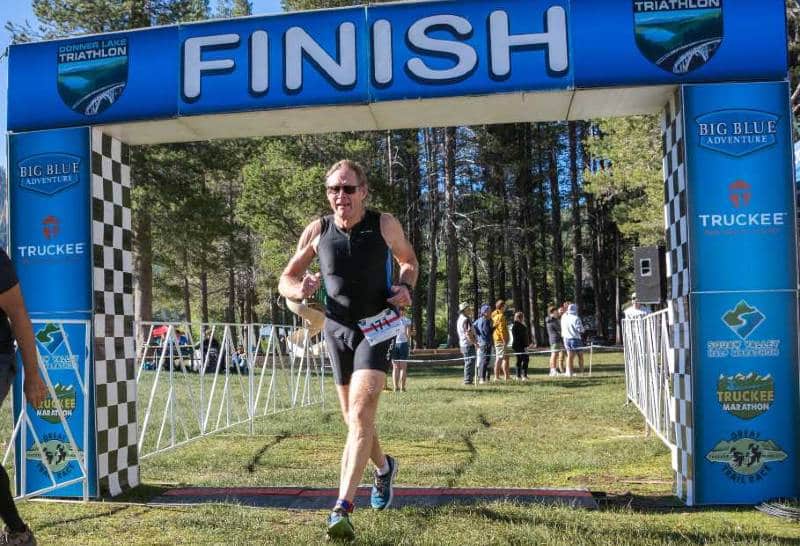How To Build Confidence For Triathlon

Triathlon is much more enjoyable when we approach it mentally prepared and with confidence.
I’m sure that New York Yankees Hall of Fame catcher Yogi Berra would agree. Undoubtedly, had he been a triathlete, Yogi would have confidently said, “Triathlon is 90 percent mental. The other half is physical.”
Confidence is Part of Mental Toughness
In multi-sport endurance competition, confidence is an athlete’s belief in their ability to perform well and successfully complete the physical and mental challenges of the sport. Confidence includes the self-assurance and positive mindset that carries an athlete into and through the event.
An athlete’s confidence not only affects their performance but also their overall experience. Athletes who approach a race with confidence are more likely to perform at their best. They are ones who push through challenges and derive more satisfaction from their efforts, regardless of the outcome.
In short, confident athletes perform better and have more fun.
Assessing Your Confidence
In The Champion Mindset: An Athlete’s Guide to Mental Toughness, Dr. Joanna Zeiger shares personal lessons about the mental component of sports competition. Beginning from her rocky start as a seven-year-old swimmer, she describes how mental toughness has been key to her experience as an amateur, later professional triathlete who finished fourth in the triathlon at the 2000 Olympic Games.
If you are interested in getting an assessment of your confidence today, take Dr. Zeiger’s free Sisu Survey. Your answers to the questionnaire will be used to measure your confidence and seven more components of mental toughness.
How Can Senior Multi-Sport Endurance Athletes Increase Confidence?
If you want to improve your confidence, here are several ways to accomplish it. Some ways may apply to you, while others may not.
Prepare Physically
This is the belief in one’s physical fitness and training preparation. Athletes who are confident in their physical abilities are more likely to believe they have the stamina, strength, and conditioning to endure the demands of the event. From my experience, consistent, structured training leading up to a race is a real confidence builder.
If, like many triathletes, you have a weaker leg that causes some anxiety before a race, make sure you train to improve it. For example, my weakest leg has always been the run. For this reason, I have spent more time reading about run training and training for the run than on training for the swim and bike. Of course, I regularly swim and bike. However, the time spent running, including after a bike workout, is about twice that spent on the others.
Two keys to getting the most from your physical training are:
- Train wisely to avoid injury. Set realistic expectations, increase training stress gradually, get enough quality rest, and eat well.
- Keep a training diary or log. Documenting your training progress will build confidence. It may also show when you need to rest or when other things in your life are affecting your training. Remember, your body treats all stress the same. Your total stress on any day is the sum of stress from physical activity, mental tasks, and emotional challenges.
Related Post: Becoming a Confident Open Water Swimmer
Have the Right Attitude
How do you feel about being able to handle the psychological challenges that come with multi-sport endurance events? You can feel more confident when you have set and managed your expectations for the race and learned to manage discomfort, fatigue, and self-doubt.
Thoughts are the most effective weapon in the human arsenal. . . [I]t is powerful to realize that goals are reached primarily by establishing the proper state of mind.
David Miller, AWOL ON THE APPALACHIAN TRAIL
For every one of the community of triathletes over age 50 who train for winning in triathlon, many more train to complete their triathlon. Sure, we all like to win. However, our greater desire is to remain physically active, benefit from the social aspect of the sport, and grow mentally as we learn something new.
“In Scandinavia, there is a general tendency for . . . older adults today to exercise and compete in sports including triathlon. [F]or most active people today, endurance exercising is more about ‘completing’ than ‘competing’.“
Weekend-warrior athletes can feel perfectly comfortable setting their primary goal to complete the triathlon.
Plan Your Race
You will be more confident entering a race if you have a clear plan for pacing, nutrition, and hydration. You will also be more confident if you are sure that the gear you will use is in good condition and comfortable. The adage ‘Never use something for the first time on race day’ is solid advice.
Familiarity with the course and its conditions will also boost your confidence. My typical pre-race ritual is to drive the bike course, or better yet have my wife drive, to observe the road conditions (e.g. potholes) and its turns. Then, during the race, I will be more relaxed during the ride.
Confident triathletes are also adaptable. It helps to believe you can handle unexpected challenges that might arise during the race. Training in less-than-ideal weather conditions, which could be present on race day, is one way to increase adaptability. Practice changing a bike tire with a race mindset. You will ride with more confidence.
Related Post: Pros and Cons of Running in the Heat

Build on Previous Success
Success breeds success. Past successes in training and in previous races build a foundation of confidence. If you are training for your first triathlon, consider setting up a mock course representing the distance and topography. Complete this course one to two weeks before your first race.
Think hard before signing up for a race on a course with conditions that will work against you being successful. For example, is the course especially hilly but you have trained on flat terrain? Is it at a higher altitude than you live and have trained? Is the weather where the race is being held typically hotter or colder than you are comfortable?
Give yourself an opportunity to be successful under the known or most likely conditions for a race before ‘diving in’.
Related Post: Planning for a Triathlon at Higher Altitude
Within a day or two of completing a race, review its results and your experience, preferably with a friend or coach. Make note of things you did well and those for which you will better prepare for your next race.
Leverage Your Support
Having a strong support network can also enhance a triathlete’s confidence. Knowing you have family, coaches, teammates, and friends who believe in you and are cheering you on adds to one’s confidence.
What Do You Think?
Are you a confident triathlete? If so, what have you learned about confidence in your triathlon journey? What helps you be more confident on race day?
Share your thoughts and comments below.
Comments: Please note that I review all comments before they are posted. You will be notified by email when your comment is approved. Even if you do not submit a comment, you may subscribe to be notified when a comment is published.
